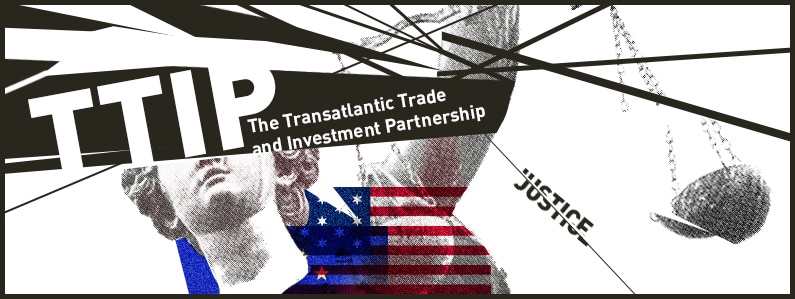Today the European Parliament’s trade committee is expected to decide whether to give the European Commision carte blanche to continue negotiations on a mechanism that would make it easier for foreign corporations to influence legislation in Europe. Committee members are voting on amendments to their positions on the proposed EU-US Transatlantic Trade and Investment Partnership (TTIP) trade agreement. Perhaps the most politically contentious is an amendment that would determine whether an extra-judicial mechanism called the Investor-State Dispute Settlement (ISDS) will be included in TTIP.
However, that’s not the only issue at stake in today’s vote. Regardless of whether ISDS is included, TTIP puts at risk the fundamental rights of people in the EU and US alike. Ensuring transparent and democratically accountable legislative processes is vitally important, but so too is the future of privacy, free expression, digital security, and the free and open internet.
Negotiations on TTIP have taken place mostly behind closed doors. But when word got out about the ISDS provisions, the European Commission conducted a broad public consultation on the issue. The Commission received a record-breaking number of responses, totalling nearly 150,000.More than 97% of the respondents opposed including the ISDS in TTIP [PDF]. Unfortunately, not many people know what else is in TTIP — most of the draft texts are kept secret and only a few have been leaked to the public. Nor do they understand why they should be concerned even if ISDS is left out.
To help citizens and lawmakers better understand what’s at stake in negotiations on TTIP and other international trade agreements, Access today published T-TIP: 10 Things You Should Know About the EU-US Trade Agreement [PDF].TTIP could:
- Trade away the privacy rights of people in the EU. Since a debate over legal standards for protecting personal data could derail the TTIP negotiations, the European Commission appears to be trying to convince the public that privacy will not be discussed. Despite this, a leaked e-commerce proposal in TTIP and the Trade in Services Agreement (TiSA) reveals that the US has advanced provisions that would authorise the transfer of EU citizens’ personal data to any country, trumping the EU data protection framework that ensures that these data can be transferred only to countries offering a certain level of protection.
- Open up a new backdoor for government surveillance. Text leaked last year from the TTIP and TiSA talks introduces a carveout for national security that would enable any signatory country to “take any action which it considers necessary for the protection” of its security interest.
- Damage Net Neutrality across the EU. The broad, vague language in the provisions on internet access proposed by the US in the TTIP negotiations puts at risk unfettered access to the open internet. Since the proposed text lacks clarity, it could allow internet service providers to prioritise specific services, applications, or websites, or enable controversial price discrimination schemes such as “zero rating”.
- Censor or limit free expression through misguided, unbalanced intellectual property provisions. Talks on TTIP began a little over a year after the European Parliament rejected the Anti-Counterfeiting Trade Agreement (ACTA), an agreement containing intellectual property provisions that put the interests of rightsholders ahead of free expression, privacy, and other human rights. Leaked texts show that negotiators essentially copy and paste intellectual property proposals from ACTA into other agreements. If they are included in TTIP, it could allow such misguided practices as indiscriminate or widespread monitoring of internet users’ behaviour or communications, and enable internet “filtering” and censorship.
- Give foreign governments and corporate lobbyists more power in crafting laws. TTIP aims to harmonise legislation between countries to remove “barriers to trade”. Through a proposed “regulatory cooperation” regime, countries would notify trade counterparts via an opaque regulatory cooperation body when they plan to develop legislation that might have an impact on trade, including sharing draft legislation and making their legislative calendars available.
- Endanger democratically accountable legislative processes. Originally developed to protect investors from the consequences of arbitrary government decisions and weak court systems in developing countries, the ISDS mechanism now operates with an increased scope, loose rules, and little accountability to the public. This “Trojan horse” mechanism, which is already included in other international trade agreements, lets companies sue governments and challenge legislation in arbitration processes outside of established national courts. It gives private companies extended power to sue governments to force them to change their legislation, and ultimately challenge the democratically accountable right of governments to regulate.
- Come back to threaten us again in other trade agreements. Many of the currently proposed international trade agreements are related in that they contain similar provisions — and when negotiations fail, even the most contentious provisions sometimes make their way into other agreements.
